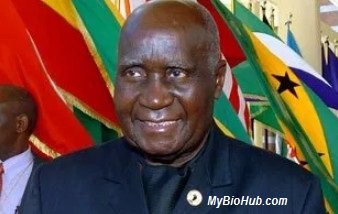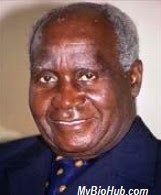Kenneth David Buchizya Kaunda was born on 28 April, 1924 to an ordained Church of Scotland missionary and teacher. He also known as KK, served as the first President of Zambia, from 1964 to 1991. He is the youngest of eight siblings. Kaunda followed his father’s steps in becoming a teacher. He was at the forefront of the struggle for independence from British rule. Dissatisfied with Harry Nkumbula’s leadership of the Northern Rhodesian African National Congress, he broke away and founded the Zambian African National Congress, later becoming the head of the United National Independence Party. He was the first President of the independent Zambia.
In 1972 all political parties except UNIP were banned. At the same time, Kenneth oversaw the acquisition of majority stakes in key foreign-owned companies. The oil crisis of 1973 and a slump in export revenues put Zambia in a state of economic crisis. International pressure forced him to change the rules that had kept him in power. Multi-party elections took place in 1991, in which Frederick Chiluba, the leader of the Movement for Multiparty Democracy, defeated Kaunda.
Kenneth was briefly stripped of Zambian citizenship in 1999 but the decision was overturned the following year. Kaunda is the youngest of eight children. He was born at Lubwa Mission in Chinsali, Northern Province of Northern Rhodesia, now Zambia. His father was the Reverend David Kaunda, an ordained Church of Scotland missionary and teacher, who was born in Nyasaland (now Malawi) and had moved to Chinsali to work at Lubwa Mission. He attended Munali Training Centre in Lusaka (August 1941 – 1943).
In April 1949, Kaunda returned to Lubwa to become a part-time teacher, but resigned in 1951. In that year he became Organizing Secretary of Northern Province’s Northern Rhodesian African National Congress. On 11 November 1953 he moved to Lusaka to take up the post of Secretary General of the ANC, under the presidency of Harry Nkumbula. The combined efforts of Kaunda and Nkumbula failed to mobilize native African peoples against the European-dominated Federation of Rhodesia and Nyasaland. In 1955 they were imprisoned for two months with hard labor for distributing subversive literature; such imprisonment and other forms of harassment were normal rites of passage for African nationalist leaders.
The experience of imprisonment had a radicalizing impact on Kaunda. The two leaders drifted apart as Nkumbula became increasingly influenced by white liberals and was seen as being willing to compromise on the issue of black majority rule, waiting until most of the indigenous population was responsibly educated before extending the franchise. The franchise was to be determined by existing property and literacy qualifications, dropping race altogether. Nkumbula’s allegedly autocratic leadership of the ANC eventually resulted in a split. Kaunda broke from the ANC and formed the Zambian African National Congress (ZANC) in October 1958. ZANC was banned in March 1959. In June Kaunda was sentenced to nine months’ imprisonment, which he spent first in Lusaka, then in Salisbury.
Eventually, however, economic troubles and increasing international pressure to bring more democracy to Africa caused Kaunda to totter. While he had been known for his vehement opposition to apartheid in South Africa, his critics were increasingly emboldened to speak out against his authoritarian rule, and also questioned his competence. His close friend Julius Nyerere had retired as president of Tanzania in 1985 and was quietly encouraging Kaunda to follow suit.
Matters quickly came to a head in the summer of 1990. In July, amid three days of rioting in the capital, Kaunda announced a referendum on whether to legalize other parties would be held that October. However, he himself argued for maintaining UNIP’s monopoly, claiming that a multiparty system would lead to chaos. The announcement almost came too late; hours later, a disgruntled officer went on the radio to announce Kaunda had been overthrown. The coup attempt was broken from three to four hours later, but it was clear Kaunda and the UNIP were stumbling. Kaunda tried to appease the opposition by moving the referendum to August 1991; the opposition claimed the original date didn’t allow enough time for voter registration. By September, however, opposition demands forced Kaunda to recommend constitutional amendments that would dismantle the one-party state. He also announced a snap general election for the following year.
Looking into his awards;
Knight Grand Cross of the Order of Prince Henry in May 1975.
Kaunda was awarded the Supreme Companion of OR Tambo by South Africa in December 2002.
Commander of the Most Courteous Order of Lesotho in October 2007.
Kaunda was the recipient of the 2007 Ubuntu Award in October 2007.



